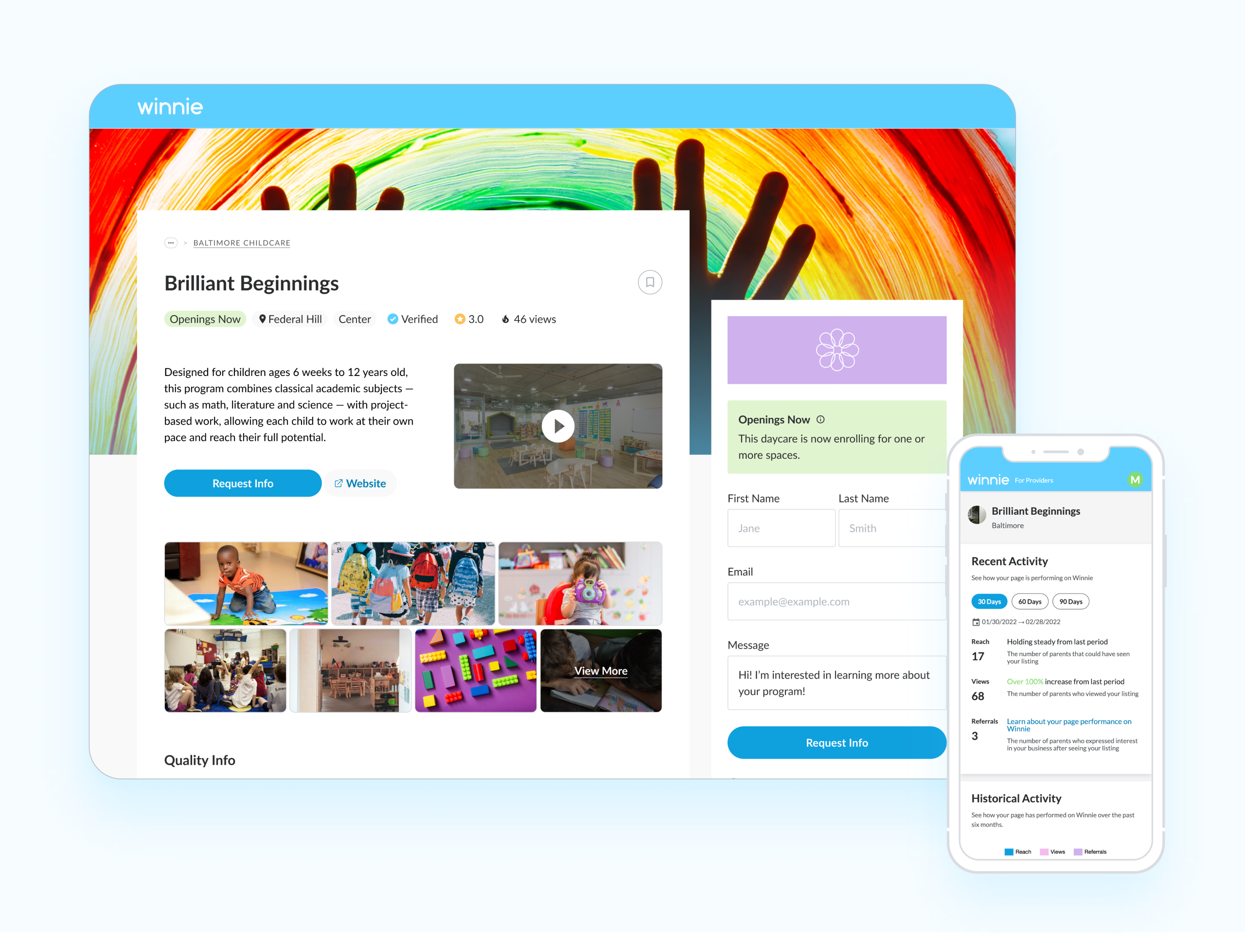When Winnie was first founded in 2016 by Sara Mauskopf and Anne Halsall, it was focused on childcare solutions built for parents.
“The other SaaS solutions in the childcare space have gone after the providers first and that’s been really hard and challenging because it’s a very fragmented market and it’s really hard to get traction,” Mauskopf said. “As parents who really needed this ourselves we decided a marketplace [was] what we understood the best, and where we felt like we could really win.”
Now, years in, after aggregating demand from parents all over the country, the startup wants to leverage its trust and comprehension in family needs to make the provider side better. So, it’s launching a product to help daycares scale their care: Winnie Pro. The startup’s service hopes to help childcare centers grow and manage their businesses, not just fill empty seats.
To start, it’s as simple as helping smaller operations launch profiles, landing pages and aggregate information in one spot. Winnie says that over half of the 250,000 daycares and preschools on the Winnie platform don’t have their own website, aka their Winnie profile is the sole way that parents can find them. And for the customers that may already have their own websites, Winnie thinks it can help by giving centers a landing page — full of reviews, program details, education types, licensing information and verification — where parents are already heading.
Winnie Pro also includes help with marketing, enrollments and even staffing. “Building in services that are always useful for your business is a way to also always deliver value to these providers, not just when they need seats,” Mauskopf added.
The new plan also means the company, which has investment money from Unusual Ventures, Homebrew, Day One Ventures, Reach Capital and, most recently, a fresh check from Salesforce Ventures, has an expanded business model. The company is now pursuing a SaaS-like model in which it charges a monthly fee, which ranges based on the capacity of the center, for these new services.
Previously, Winnie made money based on how many parents it sent to a childcare center, or the pay-per-lead model. The strategy worked well over the pandemic because Winnie experienced a surge in traffic, leading to 8x growth in revenue, Mauskopf says.
“Unlike subscription revenue, [pay-per-lead] varies every month based on how many parents you are trying to care for,” Mauskopf said. “One of the things we saw recently was that a lot of providers were limited by staffing challenges, so they were like, I can’t take any more leads right now.”
The company is now pursuing a SaaS-like model in which it charges a monthly fee, which ranges based on the capacity of the center, to help businesses with marketing, enrollments and even staffing. Beta customers include Guidepost Montessori and Izzi.

“It’s not just about building some back-end tools to help providers run their businesses more efficiently,” she said. “But really about making the way that parents find care better and more efficient — especially in this changing world where it’s not just nine to five childcare.”
The pivoting business model feels like a natural evolution for the company, which can now give consultancy-like advice to centers based on the demand that it sees from parents. For example, Winnie could tell a business that parents in their geography are hungry for drop-in care and advise them to hire accordingly to service demand, and eventually increase revenue.
For Mauskopf, the new product was already validated from the fact that a simple marketplace connecting people to care isn’t enough.
“I think there was a part of us, before the pandemic, that always wondered, ‘what if every employer just had childcare on site?’ sort of how healthcare is provided by an employer,” she said. “Now, we’re more sure than ever that the answer is yes because people don’t go into an office every day. And there’s not one size fits all for the kinds of care. And employers, for the most part, are not helping solve the challenge for families in a real way.”
It’s time for the VC community to stop overlooking the childcare industry































Comment